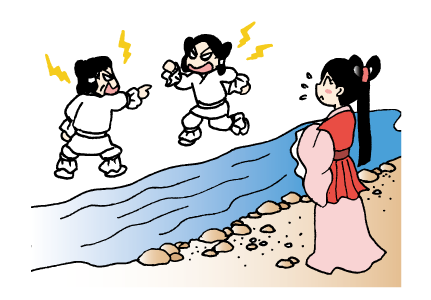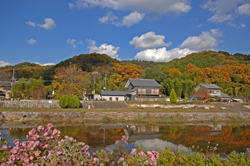第15話「火花散る、歌のかけ合い」
『古事記』下つ巻「袁祁命と志毘臣」より
古代、人々の間に「歌垣(うたがき)」という風習がありました。これは、若い男女が集まって舞や歌のかけ合い、食事をするもので、そこは求婚の場でもありました。今日で言う「合コン」のようなものでしょうか。この「歌垣」でのエピソードが『古事記』にも描かれています。
袁祁命(をけのみこと・のちの顕宗天皇)が天皇として天下をおさめる前のことです。ある日の歌垣で、袁祁命が妻にしたいと思っていた女性・大魚(おうを)の、手をとる者がいました。平群臣(へぐりのおみ=奈良県平群町の豪族)の祖先・志毘臣(しびのおみ)です。
負けじと歌垣の場に立った袁祁命に、志毘臣は歌をよみ、下の句を求めます。
「大宮の 彼(をと)つ端手 隅傾けり」
──袁祁命殿の宮殿は、あっちの隅が傾いてしまっておるぞ。
これを受けて、袁祁命も歌を返します。
「大匠 劣(をぢな)みこそ 隅傾けれ」
──それは、大工の棟梁が下手だっただけのことだ。
志毘臣は続けて、皮肉をこめて歌をよみます。
「大君の 心を緩み 臣の子の 八重の柴垣 入り立たず」
──そなたの心がだらしないから、臣下である私の家の柴垣に、入れずにいるのだ。
袁祁命も、このような歌でやり返します。
「潮瀬の 波折りを見れば 遊び来る 鮪(しび)が端手に 妻立てり見ゆ」
──浅瀬の波が崩れるのを見ていると、泳いできた鮪(志毘臣のこと)のわきに、私の妻が立っているのが見えるぞ。
「大魚よし 鮪突く海人よ 其が離れば 心(うら)恋しけむ 鮪突く志毘」
──鮪(ここでは女性のこと)を突いて捕ろうとする海人(志毘臣のこと)よ。それが離れていったら、こころ悲しく思うだろうよ。鮪を突く志毘よ。
歌のかけ合いはこのあとも、夜が明けるまで続きました。
そして二人が別れた翌朝、袁祁命は兄の意祁命(おけのみこと)と軍勢を集めて志毘臣の家に討ち入り、志毘臣を葬ったのです。
かねてより政敵同士であった袁祁命と志毘臣ですが、この夜の歌垣での出来事が、二人の関係をいっそう良からぬものにしたことは、想像にかたくないでしょう。いつの世も、女性をめぐる男同士の確執は絶えないようです。

英訳文を表示する(For English)
Episode 15:
A Fierce Battle of Poetry
From the Kojiki, Volume III
“Prince Woke and Shibi-no-Omi”
In ancient times, there used to be a custom among people to go to utagaki, a kind of party at which young men and women gathered and enjoyed dancing and exchanging poetry over food and drink. Utagaki were also opportunities to make a marriage proposal. They were probably like today’s singles’ parties. An episode at an utagaki is recorded in the Kojiki.
Before ascending to the throne and reigning over the nation, Prince Woke (the future Emperor Kenzo) went to an utagaki one day. There he saw a man trying to take a woman’s hand. Her name was Ouo (Ouo literally means “big fish”), and she was the woman the prince wanted to marry. The man was named Shibi-no-Omi (Shibi literally means “bluefin”), and was a member of the Heguri-no-omi (a powerful family in Heguri-cho, Nara Prefecture).
The prince made his way to the utagaki to compete against Shibi-no-Omi. Shibi-no-Omi composed the following poem and had it passed to the prince, asking him to reply to it.
Omiya no ototsu hatade sumi katabukeri
(The far corner of your palace is leaning, Prince Woke.)
The prince replied.
Otakumi ojinamikoso sumi katabukere
(It’s just that the master carpenter was unskillful.)
Shibi-no-Omi continued to send poems filled with sarcasm.
Okimi no kokoro o yurumi ominoko no yaeno shibagaki iritatazu
(Since you are weak-minded, you cannot get through the layers of hedges around my house, even though we are your vassals.)
The prince answered back with these poems.
Shiose no naori wo mireba asobikuru shibi ga hatade ni tsuma taterimiyu
(Looking at the waves breaking in shallow waters, I see a shibi (bluefin, indicating Shibi-no-Omi) swimming there, and my wife standing at its side.)
Ouo yoshi shibitsuku amayo shiga hanarereba urakoshikemu shibitsuku shibi
(A diver (indicating Shibi-no-Omi) is trying to spear a fish (indicating a woman). He will feel sad if it gets away. What do you say, Shibi-no-Omi?)
The exchange of poems continued until dawn.
The next morning after they parted, Prince Woke, with his brother Prince Oke (the future Emperor Ninken), raised their army, raided Shibi-no-Omi’s house and killed him.
For a long time, Prince Woke and Shibi-no-Omi had been political enemies, but it is not hard to imagine that what happened at the utagaki that night worsened their relationship. It seems disputes between two men for a woman’s love never disappear, throughout history.
Related tourism site:
Tsuba-ichi(Kanaya, Sakurai City)
Tsuba-ichi was an ancient marketplace where people bartered merchandise, and an origin of the markets of later ages. The area was also the venue for utagaki, a place for marriage proposals in ancient times. In spring and autumn, young men and women gathered there and exchanged love poems passionately.
